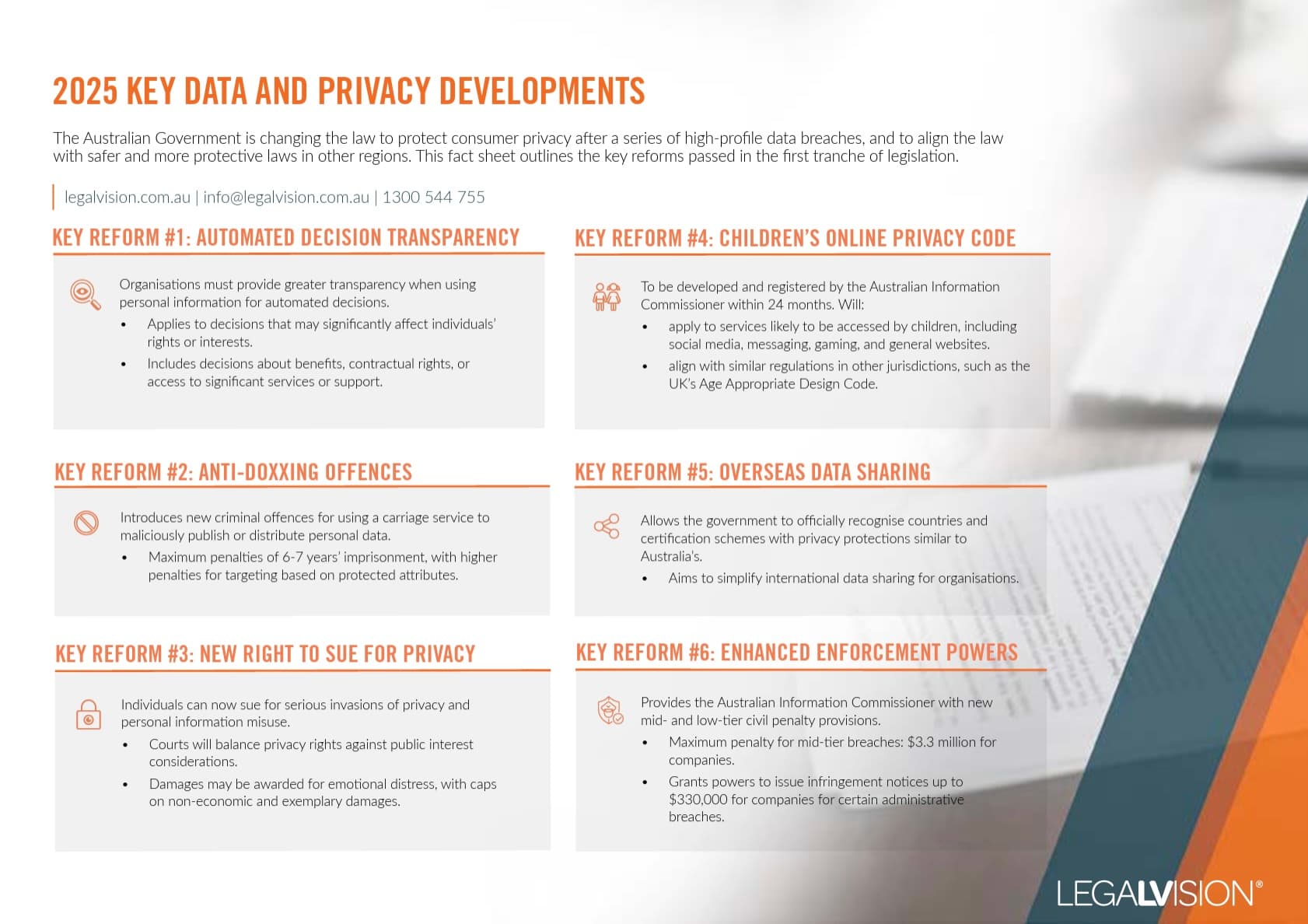In Short
- Website terms and conditions are essential for governing relationships with visitors, users, and customers.
- Key terms include visitor agreement, liability limitations, third-party content, and acceptable use.
- Businesses should also address cookies, refund policies, and the ability to amend terms.
Tips for Businesses
Make sure your website’s terms and conditions are clear and easy to find. Include key points like ownership details, liability limits, and a refund policy if you sell products. Regularly update them and ensure visitors agree to them before using your site.
On this page
- 1. Visitor’s Agreement to the Website Terms and Conditions
- 2. Details of the Website’s Ownership
- 3. Reference to Other Relevant Policies
- 4. Policy Regarding Cookies
- 5. Any Limitation Placed on Your Liability
- 6. Reference to Third Party Material
- 7. Acceptable Use and Clear Consequences of Use
- 8. Ability to Amend the Terms and Conditions
- 9. A Clear Refund Policy
- Key Takeaways
- Frequently Asked Questions
To ensure the success and safety of your business, it is crucial to establish a comprehensive set of website terms and conditions that apply to your visitors, users, and customers. These will govern the relationship between your business entity, as the website operator, and the mentioned parties. Regardless of whether your website sells products or services, providing clear terms and conditions is essential.
These terms serve as a transparent agreement with website visitors, limiting their actions concerning the information and intellectual property on the site. By implementing a clear set of website terms and conditions, you minimise the risk of legal action from visitors due to their use of your website. This article discusses nine key terms that you should include in your website terms and conditions.
1. Visitor’s Agreement to the Website Terms and Conditions
For your terms and conditions to be effective, ensure that visitors can easily read and agree to them. Additionally, display the terms prominently on your website and provide options for acceptance, such as ticking a box or clicking a button. Alternatively, you can simply display your terms and allow the visitors’ continued use of your website to show their acceptance.
Clearly state in your terms and conditions that if a visitor chooses not to agree, they should refrain from using the website. Make it explicit that disagreement with the terms prohibits continued use of the site.
2. Details of the Website’s Ownership
Your website’s terms and conditions must clearly state the website’s URL and provide comprehensive information about its ownership and operation. This ensures transparency for all visitors and users, establishing your identity as the engaged party. It facilitates accessible communication and reinforces your ownership of the posted content.
Continue reading this article below the form3. Reference to Other Relevant Policies
Your website’s interaction with visitors is regulated by the website terms and conditions, along with any other applicable business policies accessible on the site. Typically, this includes a Privacy Policy. This is because websites commonly gather personal information from visitors, such as through the use of cookies.

This factsheet outlines the Australian Government’s strengthened consumer privacy laws in 2025 following major data breaches and their alignment with global standards.
4. Policy Regarding Cookies
If your website utilises cookies to track visitors’ browsing preferences, then personal information may be stored by your business for use by third parties. In such instances, it is crucial to inform website visitors about this practice in your terms and conditions or Privacy Policy. Acknowledging your use of cookies and directing users to your Privacy Policy is often sufficient for compliance.
5. Any Limitation Placed on Your Liability
You do not have information about the personal circumstances of your website visitors. Additionally, you cannot regulate how they utilise the information they find on your site. To avoid being held accountable for any losses they may incur from relying on your website’s information, it is essential to state in your terms and conditions that visitors use your website at their own risk. Moreover, you should explicitly exclude liability to the extent possible. Finally, ensure that visitors indemnify you against any liability stemming from their use of your website.
6. Reference to Third Party Material
If your website features third-party content not owned by you, the website owner or operator, ensure proper acknowledgment of this material on your site. Include this acknowledgment in your website’s terms and conditions. You should clearly state that visitors are prohibited from reproducing any such material without the owner’s consent.
If your website contains links to other websites which you do not control, then your website terms and conditions should say:
- that those links are provided for convenience only;
- that those links do not constitute a recommendation or endorsement by you; and
- visitors to your website acknowledge that they use them at their own risk.
7. Acceptable Use and Clear Consequences of Use
Ensure that your website’s terms and conditions explicitly state that visitors must use the website solely for lawful purposes. Remind them that engaging in unlawful activities on your website may result in offences or claims against them, for which you bear no liability.
8. Ability to Amend the Terms and Conditions
Constant updates and changes to website content require your website terms and conditions to address this explicitly. Clarify that the content on your website, including the terms and conditions, may change without prior notice. You should emphasise that users’ ongoing use of the website will signify their acceptance of any such modifications.
9. A Clear Refund Policy
If you sell goods or services through your website, you will need to ensure that you provide a refund policy to your customers. It is appropriate to provide this in the website terms and conditions.
Key Takeaways
To ensure the success and safety of your business, establish comprehensive website terms and conditions applicable to visitors, users, and customers. These terms govern the relationship between your business and these parties, fostering transparency and clarity. Key considerations include facilitating visitor agreement through clear options for acceptance or rejection, providing ownership details for transparency, referencing other relevant policies like a Privacy Policy, and articulating a clear cookie policy. Additionally, limit liability, acknowledge third-party material, define acceptable use, address the ability to amend terms, and incorporate a clear refund policy, especially for businesses selling goods or services. Implementing these key terms minimises legal risks, establishes transparent agreements with visitors, and creates a secure online environment.
If you require any assistance with your website’s terms and conditions, our experienced business lawyers can assist as part of our LegalVision membership. You will have unlimited access to lawyers to answer your questions and draft and review your documents for a low monthly fee. Call us today on 1300 544 755 or visit our membership page.
Frequently Asked Questions
Do I need an acceptable use policy in addition to these terms and conditions?
An acceptable use policy contains a set of rules applied by a business that restricts the ways in which users can use a website or system. This will generally contain sections that prohibit the following:
- unlawful conduct;
- behaviour that may bring your business into disrepute;
- conduct that affects the rights of others (including privacy, harassment and defamation);
- tampering with the site, like uploading viruses or doing anything that may damage or interfere with the site; and
- posting links to the site in a way that would make others think you are affiliated or in partnership.
The level of detail needed for these points varies based on your website or platform. You can adequately address this in your website’s terms and conditions. If you desire more information on these points or wish to include additional details, you may consider creating a separate document.
Website terms serve to safeguard your website, encompassing your content, your role in website provision, and your obligations to visitors. Conversely, sales or business terms protect your business by elucidating consumer contracts, addressing consumer law matters, and specifying liability limitations.
We appreciate your feedback – your submission has been successfully received.












